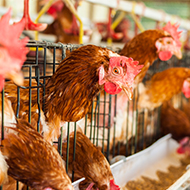Peeing contagious for chimpanzees, study finds
The act of urination was found to be socially contagious among chimpanzees.
A new study has suggested that urinating might be a contagious behaviour among chimpanzees.
Keepers at the Kumamoto Sanctuary in Japan believe that their captive chimpanzees may be engaging in ‘contagious urinations’, where the primates urinate in response to the urinations of others nearby.
To examine this phenomenon, researchers from Kyoto University monitored the behaviour of 20 chimpanzees living at the sanctuary over the course of more than 600 hours. This included 1,328 urination events, which were analysed in the context of other nearby individuals.
The data confirmed that the act of urination is socially contagious among chimpanzees. The recorded urination events appeared to be synchronised with other chimpanzees, rather than occurring at random times.
This contagious urination was increased by physical proximity with the initial urinator. Chimpanzees in lower dominance ranks appeared more likely to follow urination behaviours.
This also suggests that contagious urination could be influenced by a social hierarchy, so the behaviour tends to ‘flow down’ the dominance structure.
Based on assumptions from the semi-voluntary behaviour of yawning, the researchers also expected social closeness to be a factor in urination patterns.
However, the urination events showed no link between socially close pairs and contagious urination. Instead it was the social hierarchy which led urination patterns among the group.
The researchers say that this seemingly mundane behaviour could have further implications for social behaviours among chimpanzees. They say that contagious peeing could provide insights into group cohesion, coordination and the social bonds between the primates.
Shinya Yamamoto, from Kyoto University, said: “This was an unexpected and fascinating result, as it opens up multiple possibilities for interpretation,
“For instance, it could reflect hidden leadership in synchronising group activities, the reinforcement of social bonds, or attention bias among lower-ranking individuals. These findings raise intriguing questions about the social functions of this behaviour.”
The researchers say that further study could look into the specific mechanisms of contagious urination in chimpanzees, as well as investigating whether this occurs in other species.
The full study can be found in the journal Current Biology.
Image © Shutterstock



 An Avian Influenza Prevention Zone (AIPZ) has been introduced across Wales.
An Avian Influenza Prevention Zone (AIPZ) has been introduced across Wales.